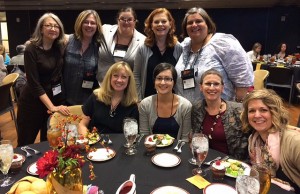Workshops, Wed. 9-9:50
W.02 Cultivating Research Capacity through International Exchanges about Higher Education Writing Research
Xiaobo Wang, Georgia State University, Atlanta
W.11 Cultivating Vernacular Eloquence: A Workshop on Speech and Writing Honoring Peter Elbow
Mary Hocks
Thurs 10:30-11:45
A.44 Improving the Experience and Efficacy of Testing for Placement While taking critical stances toward testing, these speakers present research-based advice about how to improve writing assessment practices. C125
Meng Yu, Georgia State University, Atlanta, “Building Boundary of Writing Assessment through Validation”
Thurs 1:45-3:00
C.41 Rhetorics of Disability: Cultivating Change across Discourse Communities and Developing Connections for Receptivity This panel explores disability rhetorics in popular and academic cultural arenas to bring awareness of representation and inclusivity. Portland Ballroom 254
Kristeen Cherney, Georgia State University, “Cultivating Digital Inclusion: Assessing the Challenges of Digital Classroom Texts and Inclusivity on the Web”
Thurs 4:45-6:00
E.16 Building a Mentor Program: Shadow Clusters, Immersion, and Integration Panel discusses the shift in the mentoring program for GTAs. Changes include shadowing, immersion, and program and course integration. B115
Speakers: Daniel Abitz, Georgia State University
Angela Marie Christie, Georgia State University
Charles Grimm, Georgia State University
Yunye Yu, Georgia State University
E.39 Cultivating Community Action and Response The panelists provide theoretical and practical resources for social engagement. C121
Chair: Barbara Hall, Perimeter College/Georgia State University
Friday 9:30-10:45
Cultivating Leadership G.01 Cultivating Leadership on and off Campus: A Roundtable with Senior Administrators
In this Cultivate roundtable, senior faculty who have served in multiple leadership roles will discuss how leadership skills and strategies cross over into areas both expected and unexpected, on and off campus, and how we might communicate these to junior faculty in order to cultivate future leaders. After each facilitator briefly shares his or her unique experiences and insights, attendees will have the opportunity to engage in Q & A and discussion about effective and proactive leadership strategies.
Portland Ballroom 253
Lynee Gaillet
G.13 Posthuman Subjectivity and Nonhuman Rhetoric Speakers discuss issues of posthuman subjectivity, nonhuman rhetoric, and vitalism. D134
Baotong Gu, Georgia State University, “Face, Precious Memories, and Poetic Rhetoric
- Dis/appearance of Reality”
Xiaobo Wang, Georgia State University, “Face, Precious Memories, and Poetic Rhetoric
- Dis/appearance of Reality”
G.45 Religion Matters: Cultivating Public Voices in Composition Panelists discuss the affordances of engagement at the intersection of religious studies and secular matters in the composition classroom. A109
Nathan Wagner, Georgia State University, “Keeping the Faith: Student Belief as Academic Discourse”
Friday 12:30-1:45
I.25 Changing Perspectives on Multimodal Composition Pedagogies: Utilizing (Inter)Modalities, Art, and Technology to Teach Transferable Rhetorical and Technical Competence This panel presents different digital composition pedagogies with an eye toward teaching students transferable rhetorical/technical skills. B115
Speakers: Matthew Sansbury, Georgia State University, “Cultivating Change by Listening to Our Past: Transferring Interdependent Modalities of Composition and Rhetoric from the Enlightenment for 21st-Century Pedagogies”
Lelania Watkins, Georgia State University, “Composing Forward and Backward: Utilizing Multimodality and Art to Reshape Composition Pedagogy”
Friday 2:00-3:15
J.42 Harvey J. Graff, Literacy Studies, and Composition This roundtable will reflect on literacy studies and composition through the work of Harvey J. Graff. Portland Ballroom 253
Michael Harker, Georgia State University, “See Harvey J. Graff, or, A Necessary Beginning for the ‘New’ Humanities”
Friday 3:30-4:45
K.27 Inhabiting and Subverting Online Spaces Blogs, games, and discussion forums are sites that invite styles of participation that can generate social change. Panelists will critique and explore the possibilities. B111
Chair: Roger Austin, Georgia State University, Atlanta
K.29 Go Your Own Way: Gateways and Barriers to Student Writer Agencies This session explores the limits and possibilities of source use and misuse and threshold concepts. D132
Chair: Douglas Hall, Georgia State University
K.49 Multimodal Moves in the Writing Classroom This panel explores the integration of multimodal design into writing classrooms and the relationship between hybrid and f2f learning. C126
Speakers: Paige Arrington, Georgia State University, “Bridging Hybrid and F2F Composition Classrooms via Digital Pedagogy”
Friday 6:30-7:30
FSIG.16 Joining the Conversation: A Discussion about Graduate Student Publishing An open roundtable discussion between experienced faculty and graduate students regarding best practices for publishing in graduate school.
A103
Speakers: Matthew Sansbury, Georgia State University
Saturday 12:15-1:30
M.25 Cultivating Success: Rethinking Retention Programs and Pedagogies A disruption of retention discourse can be enacted by cultivating different ways of understanding student success and persistence.
E141
Cristine Busser, Georgia State University, “Retention and ‘Student Success’: Disrupting Institutional Notions of Success in FirstYear Composition”
Ashley Holmes, Georgia State University, “Locating Retention: Data, Surveillance, and Swipe Technologies”

